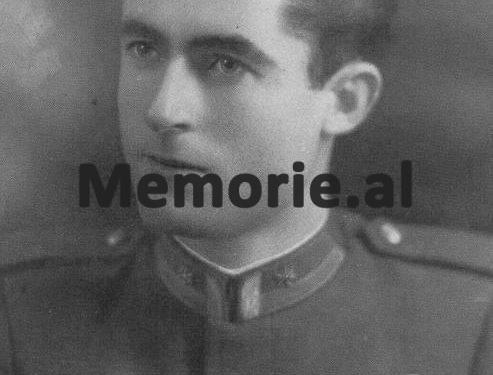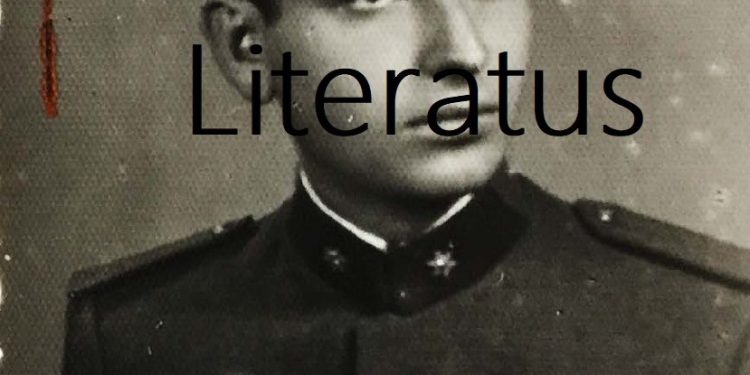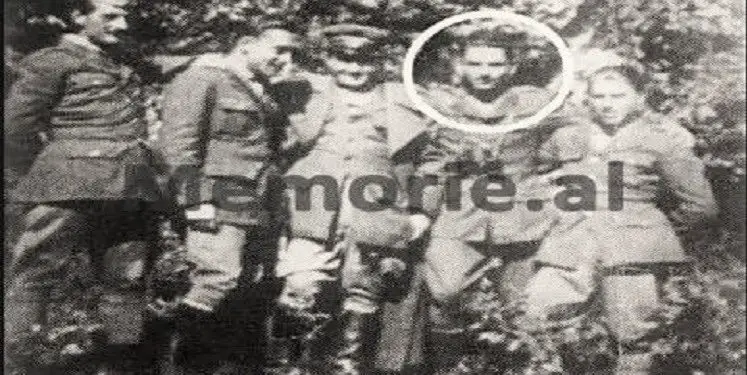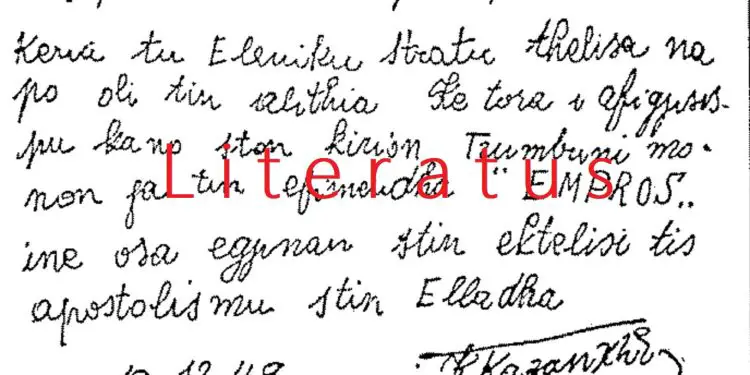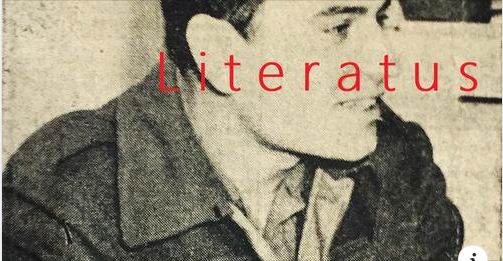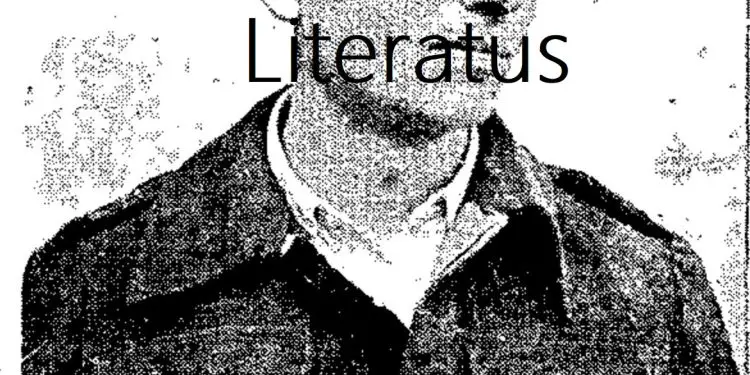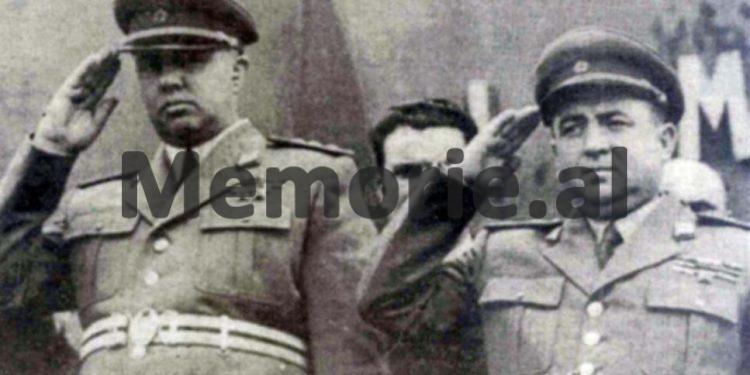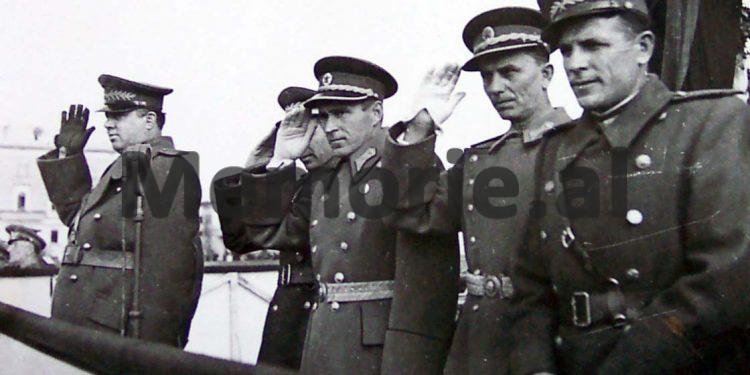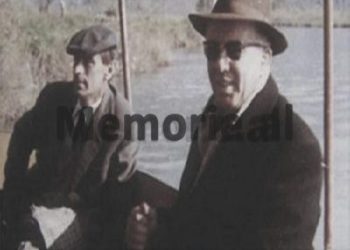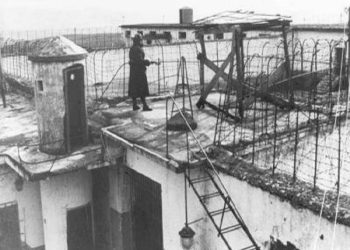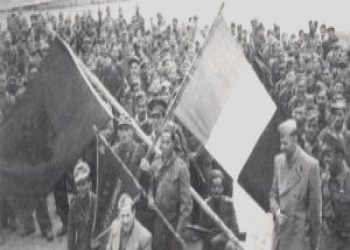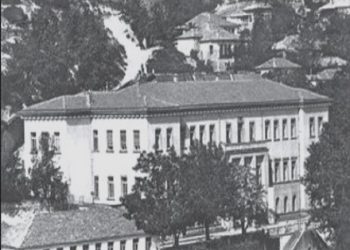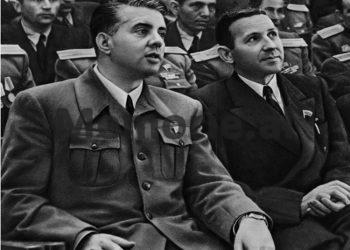By Stavri J. DAJO
Second part
The failed secret mission of the Albanian explorer Koço Kazanxhi in Greece, his arrest and death sentence (1948-1951) –
Memorie.al / After the Second World War and the conspiratorial Churchill-Stalin meeting, in October 1944 in Moscow (which marked the division of the east-west influence zones) it was decided that Greece would move to the western orbit. The Greek Communist Party (PKG) did not agree with this decision of the Great Powers and tried to usurp power by force, without accepting the parliamentary order and free elections. Its violent reaction caused the bloody clashes of December 1944 that formally brought about the cease-fire moratorium or, in other words, the Varkiza Agreement (February 12, 1945), the terms of which were eventually violated by the warring parties. As a result, a devastating fratricidal war broke out in Greece, known as the Civil War (1946-1949), with thousands of victims on both sides, from the Greek Democratic Army (UDG), formed by the communists, and the Greek National Army (UKG). -government army-, but also from simple and defenseless civilians.
According to the judicial fascicle
Historical framework-
Continues from last issue
The mission would be supported by this headquarters, which had been notified in advance. After completing the mission, with the help of his Greek friends, he would return from Greece to his post. The legend was thick and Kazanxhiu did not believe it. He was given a false identity card in the name of Christos Kampanis, born in 1923, in the village of Mikri Gotitsa in Ioannina, signed by the chief of Ioannina Security.
In mid-August 1948, the Soviet cargo ship “Pushkin” anchored in the port of Durrës, with a cargo of ammunition, clothing, flour and military equipment for the Greek communists. The operation was monitored by Myftar Tare himself and the Soviet military attaché in Tirana, Sokolov. The ship contained 400 tons of military equipment: 40 cannons, mines, tractors, dynamite, rifles and cartridges. It’s unloading lasted five days and would follow the route: Durrës-Korçë-Gramoz, while 90 tons would be transported by another oil ship, destined for the Peloponnese. The boxes for the Peloponnese front were marked with the inscription “FOKA”.
On August 28, 1948, the loading of the ship was completed (it was done only at night) and contained: 1,500 rifles, 1,000 mines, 1,000 dynamite, 180 Italian submachine guns, 15 machine guns, 15,000 hand grenades, cartridges, books and propaganda material. Kazanxhi was given 500,000 for his personal needs and 2000 dollars for his house. “My mother, sister and aunt burst into tears when they found out and begged me on their knees to refuse. They escorted me by sprinkling my feet with water, an old custom of ours, so that I would return safe and sound. But I was not convinced, Kazanxhiu told reporters. I told my brother, Alfred: “I will not return, don’t wait for me anymore”!
The crew with five Greek communists and Kosta Kazanaxhiu with the nickname “Kosta Macedonian” left on August 28 at midnight from Durrës. He made a stop in Sazan and painted it blue; they named it “Niki-Foitore”. The ship had a tonnage of 120 tons and a length of 22 meters, the property of Shkodran merchant Vaso Kadia, whose name it bore until that day, confiscated by the communist government. On Monday, August 30, 1948, the ship left Karaburun for the Aegean. No one knew anything about the purpose of my mission, not even the crew themselves.” It was the last time that Kosta Kazanxhiu saw his homeland, and he was only 24 years old!
Due to the lack of experience of the crew, instead of the Peloponnese, the ship took to the south and on Saturday September 4 approached the coast of Crete, so they were forced to turn back, but, on the way back, ran aground on the shores of a rocky island. On September 6, 1948, the bow of the ship was filled with water. The crew were beaten, grabbed and beaten. Under these circumstances, the Greek Navy spotted it and a few hours later the Air Force bombed it. The crew escaped to Fokiamos in the Peloponnese.
The news spread in Albania that the ship had sunk, but Kazanxhiu was not inside. One of the crew, named Vaitsis, having forgotten his diary on the ship, went through the partisan trial and was executed on the same day. But in the hands of the UKG authorities, his diary had fallen, with detailed data about the ship, cargo, names as well as secret information about the UDG and its leaders in Albania and the Peloponnese. In short, Kazanxhi’s mission was known in detail that day, so it was de-conspired.
At the headquarters of the Peloponnese UDG
After many vicissitudes, Kazanzhiu arrived at the partisan headquarters of the Peloponnese, the second most important headquarters of the Greek Civil War front, after that of Gramozi. After much effort, on September 12, he was attached to the Commander of the Staff, Stefanos Giuzelis, who, after the failure of the transport and the loss of the ship’s cargo, received the Albanian explorer coldly, but promised him, according to the instructions of Tirana, that in the most first, he would send him to his destination, that is, to the island of Kefalonia, which was many kilometers away from the location of the Headquarters.
In his depositions, Kazanxhiu claims details about the difficult life of the Greek guerrillas, about the partisan trials and executions of deserters for disobedience, treason, about the atrocities against the civilian population of the surrounding province, about the looting of the property of ordinary peasants until September 20, 1948. Which was essentially the day of the final disbandment of the Peloponnesian Civil War front?
Kazanxhiu shows in detail the ordeal near the headquarters, the atmosphere of mistrust among the leaders, the conspiratorial attitudes towards each other, the successive failures in the clashes with the government forces of the UKG, the wanderings in different places, the cold reception from the Peloponnese villagers, details that are not are of interest to the Albanian reader.
In December 1948, a Czechoslovak plane had fallen in Poland, which was barbarically looted by Greek guerrillas: 5,000 gold lira and 4,000 dollars were divided between the chiefs of staff, Kazanxhi says. The cleansing operations of the UKG in winter 1948 and spring 1949 destroyed all UDG structures in the Peloponnese, which did not have adequate support from the local population. Kazanxhiu testified that the leaders of the UDG stole from each other, sabotaged and intrigued like ordinary fraudsters.
During this time, Kazanxhiu complained several times to the headquarters that he should go to his destination, but no one wanted to know about his fate. In the early hours of August 31, 1949, the Chief of Staff, Stefanos Giouzelis, was killed, radio communication, cryptographic protection (encryption and encryption), and all equipment fell into the hands of the UKG.
The death of Giouzelis caused great disappointment to us all, not because Giouzelis could protect us, provide us with food, or save us. It was just a comforting symbol to all of us who were left hoping for a miracle. But his end was predetermined. And ours, says Kazanxhiu.
Meanwhile, the Gramozi front had fallen, after merciless bombing by Spitfire bomber planes with napalm (perpendicular flight) and 12,000 Greek rebels entered Albania, systematized in miserable conditions in concentration camps. A few days later, the withdrawal of the rest of the military force of the Peloponnese began, towards Albania, the only refuge. Kazanxhiu hoped that he too could retire with them.
At the beginning of October, Kazanxhiu was left alone, sheltered in caves and wandering in unknown terrain, like a fish without water. All contact with the staff men and other fighters had been lost. There was no question of a mission. In mixed moments of pessimism, he thought of either giving up or killing himself. Finally, on October 6, 1949, he came down from the rocks where he was hiding in the village of Kastor and there they recognized him, caught him and arrested him. In the first questions at the gendarmerie, he declared his true identity and admitted that he had come to Greece a few months ago, by boat as a journalist.
During the body search, they found 1,220 dollars, a loaded pistol, 20,000 drachmas and a wristwatch, which they kept at the gendarmerie station and handed over to him piece by piece in Athens, to be used for personal needs during the investigation. In his statements to the journalist Panos Troumbounis, he initially stated that the gendarmes, during the entire time of detention at the station, behaved in a friendly manner with him, but later denied this statement.
On the 7th of October a senior army officer interrogated him and asked him for details about the leaders of the Headquarters, about their places of refuge and communicated the death of many of them, but did not tell him anything about those who had been captured and had claimed the mission his. Kazanxhiu was given detailed information about the movements of the Chiefs of Staff, about places and purposes, but these were known and did not burden his position.
He was willing to accompany the army officers to the HQ accommodation for further inspection and tracking. On October 25, 1949, he appeared before the Balkan Commission of Inquiry of the UN and gave information about Albania’s assistance to the UDG. His testimony was of particular importance, due to his position in the State Security hierarchy.
The regular investigative process started on October 9, 1949 in Sparta, but due to the importance of the case, Kazanxhiu was transferred to Athens and the full investigative process was carried out there.
Truths and falsehoods of his apology
Both by the Greek investigative authorities and by the Albanian administrative services, during the subsequent review of his case, his depositions were considered not absolutely true. To a large extent, his answers were the products of compromises with reporters and investigators for lenient trial treatment, or other personal benefits.
Furthermore, members of the Staff or fighters of the UDG who were captured by the UKG or had surrendered voluntarily, testified to the investigator and in the trial against him, and even attributed to Kazanxhi, crimes that he did not commit, such as e.g., the execution of two fighters accused of disobedience in the Peloponnese.
Before the military court
The detention of Kostas Kazanxhii, accused before the investigative bodies and the prosecution, lasted until the middle of December 1951. On May 25, 1951, it was decided to hold the first trial, but due to the non-appearance of the witnesses, the Royal Commissioner (instead of the prosecutor) asked for a postponement of the trial, and the second hearing was scheduled for October 8, 1951. Finally, the trial took place on December 17, 1951, in the afternoon hours on a combined charge: accused of criminal offenses, threatening the security of the country, according to the indictments dated 11.12.1951, in the presence of the defense lawyers Stavros Kanellopoulos – who was a member of the Greek National Liberation Front (EAM) and Konstantinos Tsirimokos, also a well-known leftist factor.
The accused stated that he knew Greek, which he had learned during his stay in prison, and that he did not need a court interpreter. The indictment stated that the accused, in Ormos Fokianos of Kynuria, Lakonia, Kastori and elsewhere in the Peloponnese, during the period from September 6, 1948 to October 5, 1949, had hidden his status as a lieutenant of the Albanian police, and with the pseudonym “Macedonian- “had infiltrated the operational area of the UKG, arrived by ship from Albania, sent by the government of his country, collected secret information about the defense and external security of the Greek state and for reconnaissance purposes, used means of radio communication -radio transmitter, i.e., broadcast secret information related to UKG units…! The fulfillment of the above mission was carried out voluntarily and with obedience…”!
In his speech before the jury, Kazanxhiu stated that his mission was to infiltrate Kefalonia, to find out if there was an American fleet, warships, aircraft carriers, if the base had atomic bombs and if the Americans and Greeks were preparing for invasion aggression in Albania. I was an army officer, not a police officer, he declared. He declared that his case was a plot concocted by his ruthless State Security colleagues to get rid of him because he was an Orthodox Christian and because of his mother’s Greek ancestry. However, he also deposited other data of an intimate family nature. He also added that his father was Greek-educated, familiar with Greek culture, denied his mission at the border during the period 1947-1948, and admitted that he had been in Greece, only the last 13 months before his arrest.
His speech did not convince the jury, the president of the military court objected and added that everything the defendant claimed was false, baseless and misleading and that he knew Greek well (although he denied it stating that he had learned it long during his stay in prison), he was a determined, smart man, and that’s why he was chosen for the fulfillment of such a difficult and dangerous mission. Basically, his entire testimony was described as a mixture of real facts, fiction and manipulation, but not at all convincing.
Finally, the court, with decision 2788/17.12.1951, unanimously found the defendant Kosta Kazanxhi guilty, in terms of articles 5§2 of (AN) 375/1936 “On the punishment of crimes of espionage and criminal actions that threaten the external security of the country”, sentencing him to death twice. After communicating the court decision, the president of the Military Court asked the defendant if he had anything to add, but he only shouted: “Long lives Albania”! Causing collective indignation among those present.
His relatives living in Thessaloniki were also present in the courtroom, who supported him morally and materially during his detention. One of them, an uncle named Petro, living in Thessaloniki, was ordered by Kazanxhiu to inform his family about his punishment and the end of this ordeal.
Two days after the sentence, on December 20, 1951, Kosta Kazanxhiu was sent to Kalithea prison (Athens). From the detention centers and from the prison, in the days of agony before the firing squad, he wrote a series of letters – some of which may reach your hands, he writes expressly – to his mother Pandora and other relatives with almost the same content.
The first letter is dated December 18, 1951, the day after the trial, addressed to his uncle in Thessaloniki, named Petro, to whom he says that although the decision to sentence him to death twice was severe, but not unfairly. After that he addressed other letters, especially to his mother Pandora, for whom he felt adoration.
The content of these letters completely overturns his previous statements to the investigator or statements to reporters and contradicts everything he had admitted, affirmed or deposited until then. Kazanxhiu claims that the shortened three-hour trial was based “on baseless accusations”, considers the decision – which he had been waiting for a long time – biased.
According to the preserved epistolary, the 27-month period of questioning and investigation had passed between suffering and pain, merciless and numerous cancellations, and he pointed this out to the president of the court, to whom he firmly emphasized: “I am not condemn me, but the enmity and claims you have against my country”!
However, he says in these letters, according to the provisions of the law, the next day my lawyers made a request for the suspension of the execution of the decision and appealed to the Supreme Court for forgiveness. But these are formal procedures of local legislation. Now I expect to be transferred to another prison, he says. Memorie.al
The next issue follows




